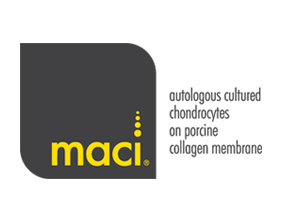Have you been told you should have, might need or could benefit from microfracture surgery?
If you answered yes to these questions, you may be eligible to participate in a company-sponsored Phase 3 clinical trial for treatment of cartilage injury in a select group of patients with articular cartilage damage in the knee.
The purpose of the company-sponsored study is to evaluate the safety and effectiveness of an investigational cartilage implant called NeoCart?, compared to the current standard of care procedure, microfracture surgery.
Learn more about NeoCart? and the company-sponsored clinical trial and trial locations.
Discover Knee Anatomy and Maladies
Explore knee anatomy and maladies with this interactive presentation. Discover the anatomy of the knee and the possible maladies that affect the way we live by learning about?Torn ACL, Patellar Dislocation and other maladies.
 Learn About Your Cartilage Injury
Learn About Your Cartilage Injury
Cartilage damage can be caused by athletic activity, traumatic injury, and even daily wear and tear. Symptoms of an injury can include aching, pain, swelling, locking, catching or giving way of the knee. Only your doctor can determine if your symptoms are due to cartilage injury.
Learn more about how cartilage injury can negatively impact your daily life and activity.
Made from a patient?s own cells, NeoCart? is an investigational cartilage tissue implant to treat certain knee cartilage injuries. The proprietary procedure uses regenerative medicine technology to create hyaline-like?cartilage tissue from a patient?s own cells.? The NeoCart??investigational study is intended to determine if NeoCart? may potentially result in durable, long-lasting patient response. To generate the NeoCart? cartilage tissue implant, a surgeon first obtains a small sample of normal cartilage from a patient?s knee through a minimally invasive arthroscopy, or ?knee scope.? This small tissue sample, or biopsy, is then treated and placed under special conditions that allow for cell growth, organization and tissue formation. This allows the patient?s own cells to form a hyaline-like cartilage tissue implant before being returned to the surgeon for implantation.? The implant can be trimmed so that it fits the injury site (like a puzzle piece). Click here to learn more about the NeoCart trial, or to see if you may be eligible to participate, please go to the Can I Participate page. Talk with your doctor about?potential risks?associated with NeoCart?. Caution: New Biologic. Limited by Federal law to investigational use only and is not available for sale.
To generate the NeoCart? cartilage tissue implant, a surgeon first obtains a small sample of normal cartilage from a patient?s knee through a minimally invasive arthroscopy, or ?knee scope.? This small tissue sample, or biopsy, is then treated and placed under special conditions that allow for cell growth, organization and tissue formation. This allows the patient?s own cells to form a hyaline-like cartilage tissue implant before being returned to the surgeon for implantation.? The implant can be trimmed so that it fits the injury site (like a puzzle piece). Click here to learn more about the NeoCart trial, or to see if you may be eligible to participate, please go to the Can I Participate page. Talk with your doctor about?potential risks?associated with NeoCart?. Caution: New Biologic. Limited by Federal law to investigational use only and is not available for sale.















